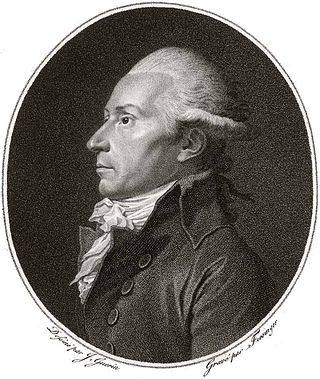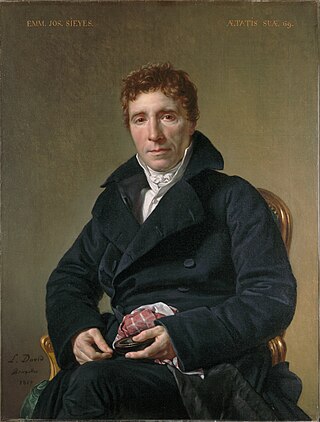
The Declaration of the Rights of Man and of the Citizen, set by France's National Constituent Assembly in 1789, is a human civil rights document from the French Revolution. Inspired by Enlightenment philosophers, the Declaration was a core statement of the values of the French Revolution and had a significant impact on the development of popular conceptions of individual liberty and democracy in Europe and worldwide.

The French Revolution was a period of political and societal change in France that began with the Estates General of 1789, and ended with the coup of 18 Brumaire in November 1799 and the formation of the French Consulate. Many of its ideas are considered fundamental principles of liberal democracy, while its values and institutions remain central to modern French political discourse.

The Tennis Court Oath was taken on 20 June 1789 by the members of the French Third Estate in a tennis court on the initiative of Jean Joseph Mounier. Their vow "not to separate and to reassemble wherever necessary until the Constitution of the kingdom is established" became a pivotal event in the French Revolution.

The National Constituent Assembly was a constituent assembly in the Kingdom of France formed from the National Assembly on 9 July 1789 during the first stages of the French Revolution. It dissolved on 30 September 1791 and was succeeded by the Legislative Assembly.

The following is a timeline of the French Revolution.

Pierre Victor, baron Malouet, was a French colonial administrator, planter, conservative publicist and monarchist politician, who signed as an émigré the Whitehall Accord.

Emmanuel Joseph Sieyès, usually known as the Abbé Sieyès, was a French Roman Catholic abbé, clergyman, and political writer who was the chief political theorist of the French Revolution (1789–1799); he also held offices in the governments of the French Consulate (1799–1804) and the First French Empire (1804–1815). His pamphlet What Is the Third Estate? (1789) became the political manifesto of the Revolution, which facilitated transforming the Estates-General into the National Assembly, in June 1789. He was offered and refused an office in the French Directory (1795–1799). After becoming a director in 1799, Sieyès was among the instigators of the Coup of 18 Brumaire, which installed Napoleon Bonaparte in power.

Jean Joseph Mounier was a French politician and judge.
This glossary of the French Revolution generally does not explicate names of individual people or their political associations; those can be found in List of people associated with the French Revolution.
The French Revolution was a period in the history of France covering the years 1789 to 1799, in which Republicans overthrew the Bourbon monarchy and the Roman Catholic Church perforce underwent radical restructuring. This article covers a period of time slightly longer than a year, from 14 July 1790, the first anniversary of the storming of the Bastille, to the establishment of the Legislative Assembly on 1 October 1791.

The French Constitution of 1791 was the first written constitution in France, created after the collapse of the absolute monarchy of the Ancien Régime. One of the basic precepts of the French Revolution was adopting constitutionality and establishing popular sovereignty.

The Estates General of 1789 was a general assembly representing the French estates of the realm: the clergy, the nobility, and the commoners. It was the last of the Estates General of the Kingdom of France.

The Fête de la Fédération was a massive holiday festival held throughout France in 1790 in honour of the French Revolution, celebrating the Revolution itself, as well as national unity.

Nicolas Bergasse was a French lawyer, philosopher, and politician, whose activity was mainly carried out during the beginning of the French Revolution during its early Monarchiens phase.

Trophime-Gérard, marquis de Lally-Tollendal was a French politician and philanthropist.

Stanislas Marie Adélaïde, comte de Clermont-Tonnerre was a French nobleman, military officer, and politician during the French Revolution.

Qu'est-ce que le Tiers-État? is an influential political pamphlet published in January 1789, shortly before the outbreak of the French Revolution, by the French writer and clergyman Abbé Emmanuel Joseph Sieyès (1748–1836). Written during the Assembly of Notables between 6 November and 12 December 1788, it was sent to the printer by 27 December 1788 for publication in the early days of 1789. There were eventually four editions of the text; initially published anonymously as a 127 page pamphlet, Sieyès revealed himself as the author after its third edition in May 1789.

The Society of the Friends of the Constitution, better known as Feuillants Club, was a political grouping that emerged during the French Revolution. It came into existence on 16 July 1791. The assembly split between the Feuillants on the right, who sought to preserve the position of the king and supported the proposed plan of the National Constituent Assembly for a constitutional monarchy; and the Jacobins on the left, who wished to press for a continuation of the overthrow of Louis XVI. It represented the last and most vigorous attempt of the moderate constitutional monarchists to steer the course of the revolution away from the radical Jacobins.
Club de l'hôtel de Massiac or the Massiac Club was a political club in Paris in France during the French Revolution. The club was formed on 20 August 1789 and dissolved after the Haitian Revolution in August 1791.

















